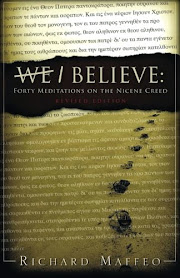I published this essay in my third book, Learning to Lean. I hope it speaks to you as it still speaks to me.
------------
But who indeed are you, a human being, to talk
back to God?
(Romans
9:20).
I dreamed a dream so real it startled me awake. I saw myself waiting at a traffic light on a street I didn’t recognize. Through the open Malibu window I heard strangers on the corner call to each other: “Roger is dead.”
I dreamed a dream so real it startled me awake. I saw myself waiting at a traffic light on a street I didn’t recognize. Through the open Malibu window I heard strangers on the corner call to each other: “Roger is dead.”
Somehow I knew who they were
talking about, and the news stunned me. I couldn’t
believe it.
I wouldn’t
believe it.
I pressed the gas pedal and raced toward the funeral home. In moments I burst into a viewing room and stood by my friend's open casket.
He lay on his left side, curled almost in a fetal position. And the blood. It was everywhere. On his chest. At the bottom of the casket. It covered his abdomen. His hands. His clothing.
I fell across him and wept – a deep, visceral sobbing.
I rarely have dreams in which I weep.
“Roger!” I shouted. “What are you doing here? What happened?”
My groans knew no balm as I wrapped my arms around him and pressed his lifeless body to myself.
Then, in the corner of my eye I noticed a man beside me. Late thirties. Five-ten, or so. Clean-shaved. Light colored short-sleeved shirt. Dark, thick hair.
I knew it was Jesus.
I stood and turned to Him, “You can’t let him die!”
It was not a request. It was an order.
“You just can’t.”
I didn’t try to choke down my grief.
“You can’t.”
Jesus looked into my eyes. I could still see his gaze hours later when I wrote down the dream. His expression unmistakable. It said: “Who are you to tell Me what to do?”
Then, as suddenly as His expression rebuked, it softened. And without a word His eyes said:
“Trust Me.
I awakened. And though the image of my friend and the coffin stayed with me, so, too, did the Lord’s words.
When I realized I had only dreamed it, I prayed awhile for Roger and then called him. He was fine. Then I sought to understand if the dream might mean something more. Perhaps a message for me.
After a time, I concluded: In the grip of even the deepest tragedy, or grief, despair, or heartache, Jesus always asks: “Who are you to tell Me what to do?”
And then He says:
“Trust Me.
I pressed the gas pedal and raced toward the funeral home. In moments I burst into a viewing room and stood by my friend's open casket.
He lay on his left side, curled almost in a fetal position. And the blood. It was everywhere. On his chest. At the bottom of the casket. It covered his abdomen. His hands. His clothing.
I fell across him and wept – a deep, visceral sobbing.
I rarely have dreams in which I weep.
“Roger!” I shouted. “What are you doing here? What happened?”
My groans knew no balm as I wrapped my arms around him and pressed his lifeless body to myself.
Then, in the corner of my eye I noticed a man beside me. Late thirties. Five-ten, or so. Clean-shaved. Light colored short-sleeved shirt. Dark, thick hair.
I knew it was Jesus.
I stood and turned to Him, “You can’t let him die!”
It was not a request. It was an order.
“You just can’t.”
I didn’t try to choke down my grief.
“You can’t.”
Jesus looked into my eyes. I could still see his gaze hours later when I wrote down the dream. His expression unmistakable. It said: “Who are you to tell Me what to do?”
Then, as suddenly as His expression rebuked, it softened. And without a word His eyes said:
“
I awakened. And though the image of my friend and the coffin stayed with me, so, too, did the Lord’s words.
When I realized I had only dreamed it, I prayed awhile for Roger and then called him. He was fine. Then I sought to understand if the dream might mean something more. Perhaps a message for me.
After a time, I concluded: In the grip of even the deepest tragedy, or grief, despair, or heartache, Jesus always asks: “Who are you to tell Me what to do?”
And then He says:
“
Beware of despairing . . . . You are
commanded to put your trust in God, and not in yourself. – St. Augustine

